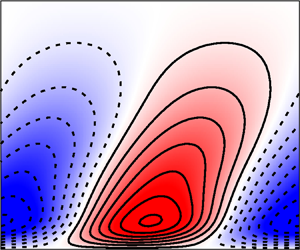Article contents
Stochastic linear modes in a turbulent channel flow
Published online by Cambridge University Press: 17 February 2021
Abstract

This study is focused on the prediction of coherent structures, propagating within a turbulent channel flow. We propose a derivation of the linearised problem based on a stochastic formulation of the Navier–Stokes equations. It consists in considering the transport of quantities by a resolved velocity (i.e. solution of the model) perturbed by a Brownian motion which models the unresolved turbulent fluctuations over the time-averaged field, here thought of as the underlying background turbulence. The associated linearised model, considering the mean velocity profile as given, predicts linear solutions evolving within a corrected mean velocity field and perturbed by modelled background turbulence. Two ways to define the statistics of the Brownian motion are proposed and compared: one based on full simulation data, and the second, data free, based on preliminary predictions from resolvent analysis. The technique is applied on turbulent channel flows at friction Reynolds numbers  $Re_\tau =180$ and
$Re_\tau =180$ and  $Re_\tau =550$, and predictions are compared with direct numerical simulation results. We show that the principal components of an ensemble of solutions of this stochastic linearised system are able to represent the leading spectral proper orthogonal decomposition modes with a similar accuracy to optimal responses coming from resolvent analysis with an eddy-viscosity model at scales where strong production occurs. For the other scales, receiving energy by nonlinear redistribution, the present strategy improves the prediction. Moreover, the second mode is systematically well predicted over all scales. This behaviour is understood by the ability of the stochastic modelling to model positive and negative inter-scale energy transfers through stochastic diffusion and random stochastic transport, while the eddy-viscosity term in resolvent analysis is purely diffusive.
$Re_\tau =550$, and predictions are compared with direct numerical simulation results. We show that the principal components of an ensemble of solutions of this stochastic linearised system are able to represent the leading spectral proper orthogonal decomposition modes with a similar accuracy to optimal responses coming from resolvent analysis with an eddy-viscosity model at scales where strong production occurs. For the other scales, receiving energy by nonlinear redistribution, the present strategy improves the prediction. Moreover, the second mode is systematically well predicted over all scales. This behaviour is understood by the ability of the stochastic modelling to model positive and negative inter-scale energy transfers through stochastic diffusion and random stochastic transport, while the eddy-viscosity term in resolvent analysis is purely diffusive.
JFM classification
- Type
- JFM Papers
- Information
- Copyright
- © The Author(s), 2021. Published by Cambridge University Press
References
REFERENCES
- 13
- Cited by



